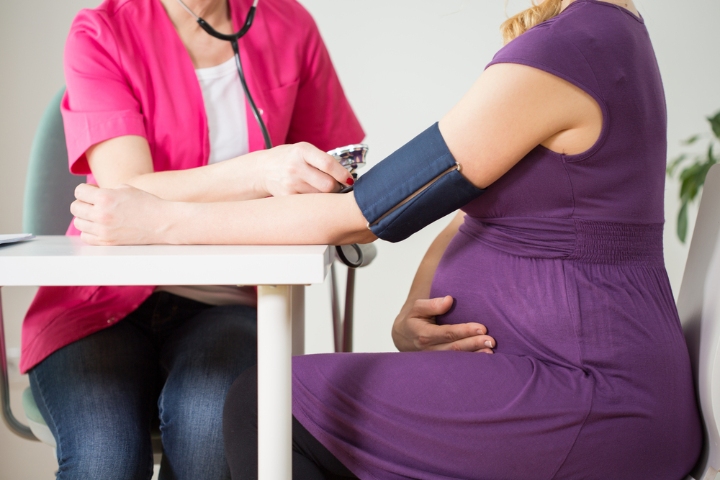
Image: Shutterstock
Pregnancy is a remarkable journey filled with physical and psychological changes. Monitoring your blood pressure is crucial during this time. High blood pressure, known as hypertension, can impact both you and your baby. In this article, we’ll explore what high blood pressure is, its diagnosis, recognition, and the different types of high blood pressure that can occur before, during, or after pregnancy. We’ll also discuss potential complications and essential steps to take if you face high blood pressure during this special period. Read on to know more!
What Is Blood Pressure?
Image: Shutterstock
Before diving into the specifics of high blood pressure during pregnancy, it’s important to understand what blood pressure is. Blood pressure is the force exerted by the blood against the walls of your arteries as it circulates through your body. It’s measured in millimeters of mercury (mmHg) and is represented as two numbers: systolic pressure (the higher number) and diastolic pressure (the lower number). Systolic pressure reflects the force when your heart beats, while diastolic pressure measures the force when your heart is at rest between beats.
What Is Considered High Blood Pressure?
Image: Shutterstock
Blood pressure varies between individuals, but there are general guidelines. A typical reading is about 120/80 mmHg (1). However, during pregnancy, these values can fluctuate due to increased circulatory demands.
High blood pressure during pregnancy is generally diagnosed when systolic pressure reaches 140 mmHg or higher and/or diastolic pressure is 90 mmHg or higher, confirmed through two separate measurements, with a minimum gap of four hours. Note that these thresholds may have slight variations depending on your healthcare provider and specific circumstances.
How Do You Know If You Have High Blood Pressure?
Image: Shutterstock
During pregnancy, your healthcare provider will routinely check your blood pressure at prenatal appointments. They will use a blood pressure cuff and a stethoscope to measure it accurately. However, it’s also important for you to be aware of the signs and symptoms of high blood pressure, as some individuals may experience:
- Severe headaches
- Vision changes, such as blurred vision or sensitivity to light
- Abdominal pain, particularly in the upper right side
- Swelling, especially in the hands and face
- Shortness of breath
- Nausea or vomiting
- Rapid weight gain
If you notice any of these symptoms, don’t hesitate to contact your healthcare provider immediately, as they could be indicative of high blood pressure-related complications.
Types Of High Blood Pressure Conditions Before, During, And After Pregnancy
Image: Shutterstock
High blood pressure conditions during pregnancy can manifest in various forms. Here are some of the most common types:
1. Chronic Hypertension
Chronic hypertension is diagnosed when you have high blood pressure before becoming pregnant or when it persists for more than 12 weeks postpartum. It requires careful management, as it can increase the risk of complications such as preterm birth, preeclampsia, and low birth weight (2).
2. Gestational Hypertension
Gestational hypertension occurs after 20 weeks of pregnancy and is characterized by high blood pressure without any other signs of preeclampsia (3). It often resolves after delivery but needs close monitoring during pregnancy to prevent complications.
3. Preeclampsia
Preeclampsia is a severe condition that usually begins after the 20th week of pregnancy and is marked by high blood pressure and damage to other organs, such as the liver and kidneys (4). Symptoms may include swelling, severe headaches, vision changes, and abdominal pain. Preeclampsia can lead to serious complications for both the mother and the baby and may require early delivery to prevent further harm.
High Blood Pressure Complications For Mother And Baby
Image: Shutterstock
High blood pressure during pregnancy poses several risks to both the mother and the baby:
For The Mother
- Increased risk of preeclampsia, eclampsia, and other cardiovascular complications.
- Potential damage to the liver, kidneys, and other organs.
- Increased risk of stroke.
- Development of gestational diabetes.
- Preterm birth, which can lead to complications for the baby.
For The Baby
- Slower growth in the womb, leading to low birth weight.
- Preterm birth, with all its associated health risks.
- Difficulty in getting enough oxygen and nutrients, affecting overall development.
- Stillbirth in severe cases.
What To Do If You Have High Blood Pressure Before, During, Or After Pregnancy
Image: Shutterstock
If you have high blood pressure, it’s crucial to work closely with your healthcare provider to manage it effectively. Here are some general guidelines:
1. Regular Prenatal Care
Attend all scheduled prenatal appointments, and make sure your healthcare provider monitors your blood pressure regularly.
2. Medications
If necessary, your healthcare provider may prescribe medications to help control your blood pressure safely during pregnancy. It’s essential to follow their guidance and take any prescribed medications as directed.
3. Lifestyle Changes
Adopt a healthy lifestyle by eating a balanced diet, engaging in regular physical activity (as recommended by your healthcare provider), maintaining a healthy weight, and avoiding smoking and drinking alcohol.
4. Delivery Plan
Discuss a delivery plan with your healthcare provider. Depending on your specific condition and the health of you and your baby, they may recommend inducing labor early or opting for a cesarean section to minimize risks.
High blood pressure during pregnancy is serious and requires careful management. Being informed about the conditions, complications, and steps to protect yourself and your baby is crucial. Prenatal care and open communication with your healthcare provider are essential for a healthy pregnancy despite high blood pressure. By following medical guidance, you can increase the chances of a successful pregnancy and a safe delivery, welcoming your baby with joy.


















